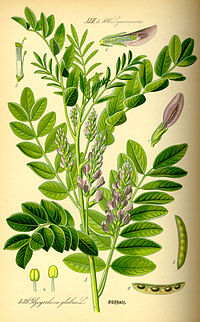
Photo from wikipedia
ABSTRACT The chemical interaction between plants and bacteria in the root zone can lead to soil decontamination. Bacteria that degrade polycyclic aromatic hydrocarbons (PAHs) have been isolated from the rhizospheres… Click to show full abstract
ABSTRACT The chemical interaction between plants and bacteria in the root zone can lead to soil decontamination. Bacteria that degrade polycyclic aromatic hydrocarbons (PAHs) have been isolated from the rhizospheres of plant species with varied biological traits; however, it is not known what phytochemicals promote contaminant degradation. One monocot and two dicotyledon plants were grown in PAH-contaminated soil from a manufactured gas plant (MGP) site. A phytotoxicity assay confirmed greater soil decontamination in rhizospheres when compared to bulk soil controls. Bacteria were isolated from plant roots (rhizobacteria) and selected for growth on anthracene and chrysene on PAH-amended plates. Rhizosphere isolates metabolized 3- and 4-ring PAHs and PAH catabolic intermediates in liquid incubations. Aromatic root exudate compounds, namely flavonoids and simple phenols, were also substrates for isolated rhizobacteria. In particular, the phenolic compounds—morin, caffeic acid, and protocatechuic acid—appear to be linked to bacterial degradation of 3- and 4-ring PAHs in the rhizosphere.
Journal Title: International Journal of Phytoremediation
Year Published: 2017
Link to full text (if available)
Share on Social Media: Sign Up to like & get
recommendations!